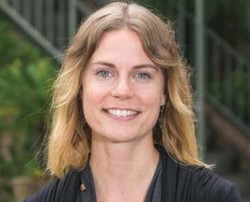Rebekah Byrne, M.D., M.P.H.
Physician, Detective, Healer
 Dr. Rebekah Byrne is part physician and part detective. She sees a patient’s physical symptoms as clues — as a body asking for a change.
Dr. Rebekah Byrne is part physician and part detective. She sees a patient’s physical symptoms as clues — as a body asking for a change.
“Symptoms are just the tip of the iceberg,” Dr. Byrne says. “We have to look beneath the surface to discover their root causes and address those in order to help the body truly heal. That’s where the detective work comes in.”
Dr. Byrne specializes in integrative medicine, which is an approach that incorporates conventional medicine, nutrition, mind-body medicine, botanical medicine and functional medicine to treat and prevent the underlying imbalances that result in symptoms.
“The lens that integrative medicine training has given me has changed the way I see each patient,” she says. Her approach doesn’t focus on just physical health, but also mental, emotional and even spiritual wellbeing.
During medical school at Tulane University, Dr. Byrne also earned a master’s degree in public health, and, after residency, she completed an advanced fellowship in integrative medicine at Swedish Family Medicine in Seattle. As such, her interests extend beyond single patients to healing whole communities and improving access to healthcare. The Pacific Northwest — where “the word is out” on integrative medicine — was a great launching pad for her career. Now she has returned to Tulane as an assistant professor and family practice physician so she can inspire a new generation on what she sees as the future of medicine.
While she admits some practitioners have misconceptions about integrative medicine, her Tulane colleagues have been nothing but supportive. “I feel really lucky to be working in this department with the people I get to work with,” she says. “They’re referring me patients who are already benefitting from the consultations.”
The foundation of her practice is to encourage self-care through addressing stress, lifestyle and nutrition. “I strongly believe that food can be medicine,” she says. “Or it can be poison to our bodies.”
For stress and anxiety, she is a big believer in mindfulness and meditation. She’s been known to sit and teach patients to meditate and how to use their breath to relax. She’s even gotten down on the floor or used the wall or a chair as a prop to show yoga or relaxation techniques. “I’m not selling patients expensive herbal supplements or telling them to go meditate on a mountaintop,” she says. “These are practical things you can integrate in your life and many of them don’t cost anything.”
This approach can bring benefits across the spectrum from diabetes, heart disease, digestive issues, chronic fatigue, thyroid issues, depression and more.
“I want to give my patients the tools to go out and take care of themselves so I never have to see them again,” she says. “That’s the goal. I practice medicine this way because I believe in it but also because I’ve seen how well it works.”
Medical School and Master’s in Public Health: Tulane University
Residency: Family Medicine, Swedish First Hill, Seattle
Fellowship: Integrative Medicine, Swedish Cherry Hill, Seattle
Board Certification: Family Medicine
Additional Training: Institute of Functional Medicine, the Center for Mind Body Medicine, and 200-hour yoga teacher training
Tulane Uptown Multispecialty Clinic/Department of Family and Community Medicine
Integrative Medicine Consultations every Friday morning
200 Broadway St., Ste. 230
(504) 988-9000 — Specify integrative medicine consultation
Mindfulness: Bringing the Mind-Body Connection to the Table
The mind-body connection is critical to good health, says Dr. Byrne. Mindful moments — which can happen in the car, while brushing your teeth, or any time you feel tension — can help with stress and improving wellbeing. Below is just one technique she shares with her patients — this one is particularly useful for focusing on food and eating mindfully.
Eliminate all screens (phones, computers, TVs) and distractions (besides good company).
Sit down at a table, in a chair with your food in front of you.
Take a few breaths, look at the food in front of you, have gratitude for the people who grew and prepared it.
Take in all the sensual qualities of the food — colors, textures and especially smells.
Bring a bite of food to your nose and inhale the aroma.
Open your mouth slowly and place the food on your tongue.
Observe the textures and flavors as you begin to chew well before swallowing.
Dr. Byrne says taking the time to eat undistracted and to notice the visually appealing factors of food makes us much more likely to reach for something healthier and to listen to our bodies’ fullness cues. “[And] colors of foods reflect their different plant nutrients, so try to eat a rainbow every day,” she says.
